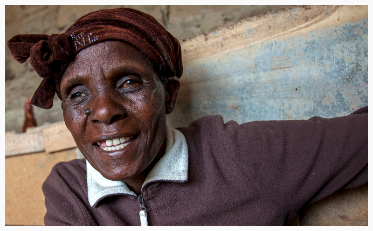Hand in Hand Eastern Africa’s saving champions
27 Sep 2013
The participants in Hand in Hand Eastern Africa’s Akiba Nyumbani (translated as ‘home savings’) campaign saved an average 3,500 Kenyan Shillings over six months – a significant achievement when 62 percent of them support entire families on less than KES 5,000 per month (US $60). Half of the campaign participants typically do not have access to running water and one in three live in mud or corrugated iron huts.
All Akiba Nyumbani participants were organised into groups, given a sealed ‘piggy bank’ and encouraged by their Hand in Hand trainers to save regularly. The best savers were rewarded in an awards ceremony in Nairobi on 12 August 2013 in the presence of officials from Kenya’s Women’s Enterprise Fund, Youth Enterprise Fund, Ministry of Agriculture (Agriculture Development Support programme) and Sida, the Swedish international development agency.

Philomena Nduku Mutuku | Shop Owner | Matuu, Kenya
The campaign’s best saver was Philomena Nduku Mutuku (pictured left), a 67-year-old shop-owner who has single-handedly brought up a family of ten, now adult, children. Her ‘piggy bank’ contained KES 195,000 (US $2,200), making her the national champion.
Philomena drew on Hand in Hand’s training to set up the only shop in a radius of 15 km. Where she used to earn a meagre KES 500 (US $6) a week from fetching water prior to the training, she now earns twice that in just a day from the shop.
Philomena feels that the basic accounting skills taught by Hand in Hand trainers were critical to help her budget and save: “I did not go to school, but I am a fast learner: thanks to the Hand in Hand training, I can now control what I spend. So during Akiba Nyumbani, I would estimate what I really needed every week and challenge myself to save the rest”.
Philomena will invest her savings in a poultry business and sell the eggs and chicken in her shop. She also plans to support her grandchildren’s education. Hand in Hand Eastern Africa CEO Pauline Ngari says that overcoming “the lack of a saving culture” is a priority for her team. Kenya’s national saving rate is far lower than that of its peers – only half of the average for all low-income countries.
The discipline of regular saving is the first step of the Hand in Hand business creation model. The model was introduced into Kenya in 2010 to empower the country’s most vulnerable and disadvantaged – often women – to work their way out of poverty by running their own businesses.
Akiba Nyumbani generated significant media interest in Kenya. The story was covered by Kenya’s leading daily newspaper, The Standard, by the Kenya Broadcasting Corporation, on KTN and K24TV.
